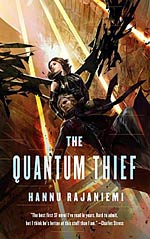
![]() everythinginstatic
everythinginstatic
1/19/2013
![]()
Oh my. Oh wow. This completely blew me away. A relatively short book jam-packed with big, bold ideas. I didn't realise how much I had missed actual sci-fi, the one that focuses on the science, until I read this book. It starts off quite simply: a thief, in the Dilemma Prison, has to shoot himself before his other self can shoot him. And from then on Rajaniemi takes you on a journey across the stars, on board the flirtatious ship Perhonen (Finnish for butterfly), alongside Mieli, a woman with her own agenda, as they journey to Mars and the moving Oubliette, a place where Time is currency and memories are prized possessions.
There's very little hand holding in this book, a fact that I found incredibly delightful and challenging at times. As someone not from a science background, with basic understanding of quantum concepts, I cannot attest to the actual validity of the science claims. However, the man does hold a PhD in Mathematical Physics, and he did start ThinkTank Maths, so I'm pretty sure he knows what he's talking about. So every 10 pages or so, I would hop on over to Wikipedia and learned about everything from the Darian Calendar to the idea of quantum travel. It's fantastic, and it's presented in such a way that even someone like me would become intrigued and look for further answers.
The characters are engaging on a variety of levels, from the basic rooting for/against to the intricate ways in which they interact. There are so many fantastic twists and turns, and ulterior motives. I loved the Martian concepts of Noble and Quiet, and the idea of both exomemory and giving back to the community through periodic back-breaking labour. Raymonde, Mieli, Jean le Flambeur, Isidore, Pixil, the zoku as a group that evolved from an MMORPG and still does raiding (be still my heart!), the Sobornost and the Great Common Task (fantastic echoes of both tsarist Russia and Soviet ideals), everything just sort of comes together in the woven narrative. The jump from first-person Jean to third person Isidore and Mieli is seamless, and indeed lends new depths to the novel, while still providing for an unreliable narrator (particularly Jean).
Finally, the writing itself. Rajaniemi really takes his time building the world, and the payoff is great. The whole post-human society comes alive, and at times I almost yearned for parts of this to become the future. The language is accessible and there is a distinct lack of massive infodumps, which would really take me out of the story. Rajaniemi makes me work for it, and I'm grateful for the effort throughout. My only complaint is that this version, the 2010 Gollancz paperback edition, did have some typos and doubled words, which grated. I had expected more of the editor.
Honestly, this book is right up there in the top 10 best sci-fi novels I've ever read. It takes me back to trying to read Asimov's Foundation, and struggling with concepts beyond my understanding, but still chugging on. At times, it made me wish I were an engineer, which is really unusual for someone who ran away from maths and physics in much the same way Jean le Flambeur ran from the Archons.
http://streetlamp-halo.shortwaveradius.com/